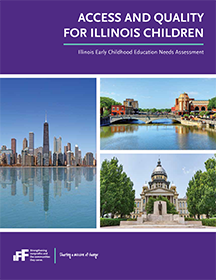 Access and Quality for Illinois Children is a statewide needs assessment that examines access to quality early childhood education (ECE) services, including both home- and center-based care and preschool programs.
Access and Quality for Illinois Children is a statewide needs assessment that examines access to quality early childhood education (ECE) services, including both home- and center-based care and preschool programs.
The goal of this report is to inform stakeholders of the disparities in access across communities in the hopes of serving the greatest number of children in need of care with the highest quality of care. Stakeholders can use the information presented to create a comprehensive, high-quality, equitable strategy for children throughout Illinois as well as reflect on targeted geographic strategies.
The report highlights the counties with the most limited access to ECE in order for investments and improvements to reach the areas with the greatest need. An additional report prepared by the Erikson Institute helps to build on the trends in access and quality identified in this needs assessment.
DOWNLOAD THE PDF | Recommendations | Online Tool
Press questions may be directed to Katie Coleman at 312 521 7381.
Please visit our online library for earlier IFF studies on the early education sector.
Recommendations
- Increase access to infant and toddler care in Illinois. This is the most expensive care to provide, and lack of access results in fewer parents returning to the workforce. More importantly, the quality of educational experiences during these very early years is crucial to child development and growth. Among other strategies, Child Care Assistance Program (CCAP) reimbursement rates need to be increased to meet the true costs of high-quality care.
- Grow supply of quality providers in Illinois’ more rural counties. Residents of rural areas across the state have far less access than urban communities to high-quality ECE providers. Given the low population density of rural communities, it is challenging for center-based providers to serve every community; therefore, home-based providers and family/friend/neighbor care are important and valued parts of the rural ECE supply.
- Promote equitable ECE access in low-income communities throughout Metro Chicago. In many of Chicago’s high-poverty communities, ECE access falls below the state average. Promoting equitable care requires increasing funding available to providers. And, as communities move toward universal 4-year-old care, community-based providers need to be part of the conversation so that the marketplace is not destabilized — and so families still have access to full-day, full-year care for their 4- and 5-year-olds.
- Expand ExceleRate participation statewide. Access to high-quality ECE services is not uniform across Illinois, due in part to limited advancement beyond the Licensing Circle of Quality in ExceleRate. Outreach strategies tailored to center-based or home-based providers are necessary to increase quality improvements.
- Support efforts for statewide collaboration across the ECE system. Many efforts exist across Illinois to support knowledge-sharing and funding, yet programs and investments are oftentimes uncoordinated with only regional concerns or a specific issue area in mind. Additionally, while many statewide data sources exist, these entities are highly disjointed. This lack of integration limits the ability to obtain a complete picture of the ECE landscape in Illinois.